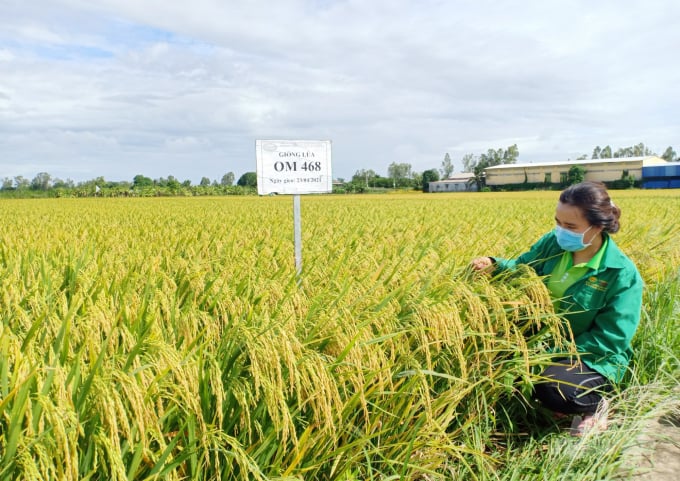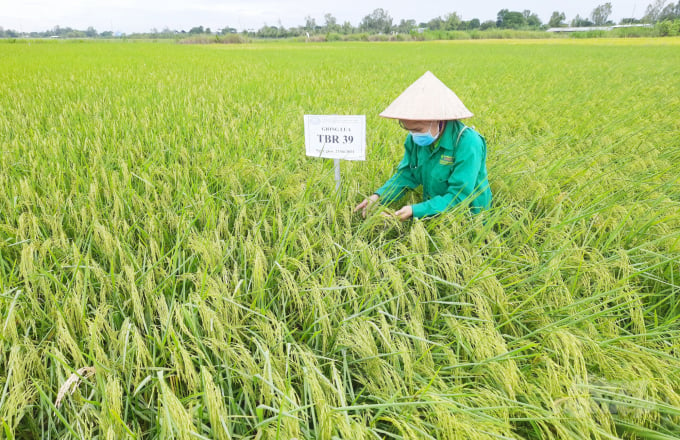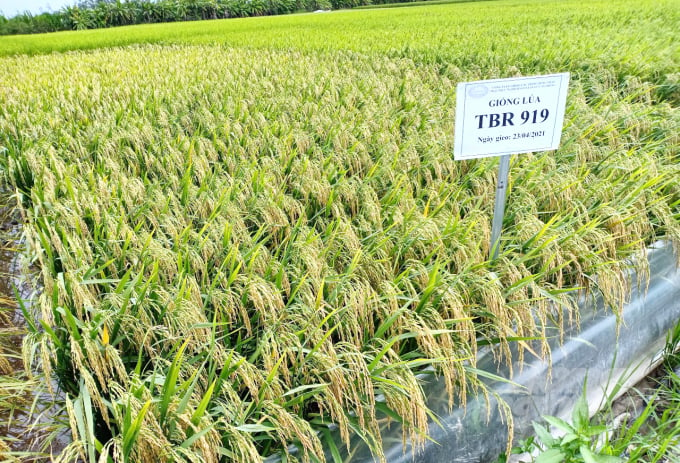November 27, 2025 | 20:50 GMT +7
November 27, 2025 | 20:50 GMT +7
Hotline: 0913.378.918
November 27, 2025 | 20:50 GMT +7
Hotline: 0913.378.918

Doseco pioneers in the seed industry in the Mekong Delta focusing on developing a strategy to select and create new rice varieties adapted to climate change. Photo: Ngoc Trinh.
In the increasingly complex climate change situation, the introduction of new high-yielding, good-quality rice varieties that are both salt- and drought-tolerant is an urgent requirement.
According to Nguyen Van Hong, General Director of Dong Thap Seed Joint Stock Company (Doseco), the company has introduced the new rice varieties and selected those with outstanding characteristics in terms of yield and quality, suitable for production conditions and especially adaptation to climate.
Since its establishment ten years ago, Doseco has consistently pursued the strategy of creating new and copyrighted varieties. Particularly, after the company’s cooperation with ThaiBinh Seed Group Joint Stock Company (ThaiBinh Seed) in 2019, the breeding and selection of new varieties have been invested and promoted further.
Since 2019, Doseco has collaborated with ThaiBinh Seed, Mekong Delta Rice Institute and other famous breeders to test and demonstrate the yield of hundreds of rice varieties.
Thereby, Doseco has achieved positive results and selected some promising new varieties such as TBR919 with 85 - 90 days growth period and capacity of replacing low-grade rice segment; TBR97 variety with 90-95 days growth time and the ability to replace quality rice lines; variety TBR39 with 100 - 110 days growth time and capacity of replacing fragrant rice lines; variety TBR819 has a growth time of 100 - 105 days with a superior yield compared to the key varieties.

The variety TBR39 is grown in trials in the Mekong Delta and the Southeast. Photo: Ngoc Trinh.
In the winter-spring crop 2021 - 2022 and the following years, Doseco and ThaiBinh Seed will continue to cooperate, test and trial produce the varieties TBR819, TBR919, TBR97, TBR39 in the Mekong Delta and Southeast provinces, while completing the supplement dossiers for the Ministry of Agriculture and Rural Development to officially recognize these varieties as soon as possible.
Specifically, OM468, a new rice variety and the product of the cooperation between the Mekong Delta Rice Institute and ThaiBinh Seed, has been experimentally produced by Doseco. After getting the recognition, it will be widely developed in the Mekong Delta and the Southeast regions.
Through many trial crops in the provinces of the Mekong Delta, the rice variety OM468 has been found to have the advantage of a short growing time of 90-95 days and therefore being suitable for 3 crops/year.
Meanwhile, the variety TBR39 has a growth period from 100-110 days with strong branch growing and good resistance to disease. Its average yield is from 5 to 5.5 tons/ha, 10-20% higher than previous seasons. That figure could be up to 6.5 to 7.5 tons/ha with fertilized land and skillful farmers. In particular, the rice variety is quite resistant to acidic and saline soils, especially suitable for rice-shrimp areas.
Nguyen Van Hong, General Director of Doseco Company, revealed that the company would continue to test OM468 in many provinces in the Mekong Delta and Southeast regions; from the salt alum areas in Ca Mau, Kien Giang, Bac Lieu, Soc Trang; the sweet alluvial area of Can Tho, Hau Giang; Long Xuyen Quadrangle and Dong Thap Muoi to the Southeast…in the summer-autumn crop of 2021
“In the models, the variety OM468 has been highly appreciated by farmers. The rice grows and develops strongly and particularly, it has few pests and diseases in the summer-autumn crop like this year,” he stressed.

The variety TBR919 has a growth period of 85 - 90 days and capacity of replacing the low-grade rice segment. Photo: Ngoc Trinh.
Similarly, the variety TBR39, which was tested in saline areas such as An Bien - Kien Giang, Go Cong Dong (Tien Giang), U Minh Ha (Ca Mau), has grown well, bloomed strongly with few diseases and high yield.
Doseco has sent 2 samples of rice OM468 and TBR39 to major Vietnamese rice exporting companies, both of which have been highly appreciated and qualified for export. The fragrant rice variety TBR39 has a delicious taste, meeting the standards of the European and American markets.
Translated by Phuong Ha
/2025/11/27/3830-1-152901_403.jpg)
(VAN) Dong Nai is developing its key crop areas, expanding planting area codes, and applying high technology to increase the value of agricultural products, aiming at a green and sustainable agriculture.

(VAN) Tay Ninh’s livestock sector is undergoing a major transformation, applying high-tech, closed-loop circular models to build sustainable value chains.
/2025/11/26/3627-4-082628_818.jpg)
(VAN) From a small café on the red basalt highlands, Le Van Hoang started a business with clean coffee, building Enjoi Coffee into a symbol of organic agriculture in the Lam Dong plateau.
/2025/11/25/0045-1-135246_13.jpg)
(VAN) Ca Mau is researching a model of sea-encroaching embankments combined with viaducts and logistics service zones, aiming both to prevent erosion and create land funds for marine economic development.

(VAN) The information was shared at the seminar 'Urban Agriculture - Solutions for Developing Green Spaces,' organized by the Kinh te & Do thi Newspaper and the Biotechnology Center of Ho Chi Minh City.
/2025/11/19/4141-2-132831_216.jpg)
(VAN) One of Japfa's outstanding solutions is implementing digital transformation and artificial intelligence (AI) to optimize operations, enhance productivity, and advance sustainable development.
/2025/11/19/4847-1-093540_448.jpg)
(VAN) The Gia Lai Provincial People’s Committee had a working session with the delegation of the U.S. Department of Agriculture, the State of Idaho, and representatives of the State's leading enterprises.